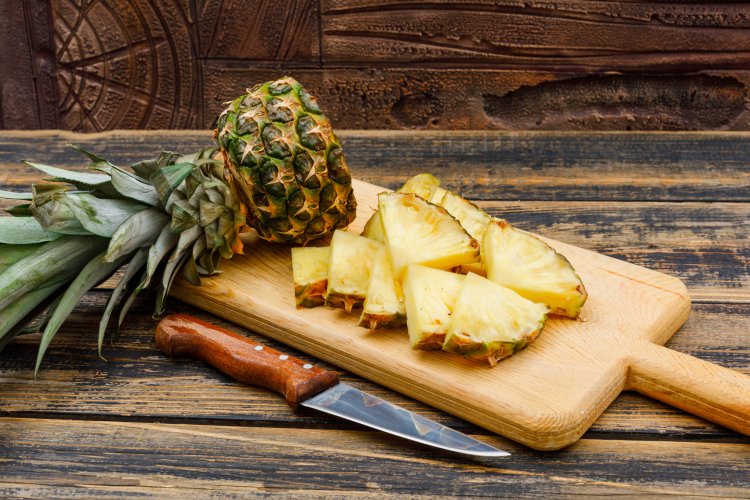Pineapple: The Tropical Wonder
Pineapple, scientifically known as Ananas comosus, is a tropical fruit celebrated for its sweet, succulent taste and vibrant flavor. Belonging to the Bromeliaceae family, it thrives in warm, humid climates and is cultivated in various parts of the world. Pineapple is not just a delicious fruit; it also boasts a rich history, impressive nutritional profile, and versatile culinary uses.

History and Origins
Native to the tropical regions of South and Central America, pineapple has a long history intertwined with indigenous cultures. It was first encountered by European explorers during their voyages to the New World. Its introduction to Europe led to widespread cultivation, and eventually, it became a globally traded commodity. Today, leading pineapple producers include countries such as Brazil, Thailand, the Philippines, and Costa Rica.
Physical Characteristics
Pineapple is characterized by its large, spiky head and rough, hexagonal-patterned skin. As it ripens, the outer shell transforms into a golden-yellow hue, indicating the fruit's readiness for consumption. The flesh of the pineapple is juicy, fibrous, and rich in flavor, with a perfect balance of sweetness and acidity. While small, black seeds are present throughout the fruit, commercially available pineapples are typically seedless or contain negligible seeds.
Nutritional Value and Health Benefits
Pineapple is not only delicious but also packed with essential nutrients. It is an excellent source of vitamin C, which supports immune function and collagen production. Moreover, pineapple contains bromelain, an enzyme with anti-inflammatory properties that aids in digestion and may alleviate various digestive ailments. Additionally, it provides an array of vitamins, minerals, and antioxidants, making it a valuable addition to a balanced diet.
Culinary Applications
The versatility of pineapple extends beyond its fresh consumption. It can be juiced, blended into smoothies, grilled, baked, or incorporated into both savory and sweet dishes. Pineapple adds a delightful sweetness and tropical flair to salads, salsas, stir-fries, desserts, and cocktails. Moreover, it is commonly canned or dried, allowing for year-round availability and convenience in culinary preparations.
Cultural Significance
Pineapple holds cultural significance in many societies as a symbol of hospitality, warmth, and generosity. In Hawaiian culture, the pineapple is a traditional symbol of welcome and hospitality, often depicted in artwork and architecture. Furthermore, pineapple motifs are prevalent in home decor and fashion, representing warmth, friendship, and good fortune.
In conclusion, pineapple stands out not only for its delicious taste and versatility but also for its rich history and cultural significance. Whether enjoyed fresh, juiced, or incorporated into various culinary creations, pineapple continues to captivate taste buds worldwide. Its nutritional benefits, culinary adaptability, and symbolic importance make it a truly remarkable fruit, embodying the spirit of hospitality and tropical indulgence.
Disclaimer
The information provided in this article is for educational purposes only and should not be considered medical advice. If you have any health concerns or are experiencing symptoms, it is important to consult with a healthcare professional, such as a doctor or clinic, for proper diagnosis and treatment. Always seek the advice of your doctor or other qualified health provider with any questions you may have regarding a medical condition. Do not disregard professional medical advice or delay in seeking it because of something you have read in this article.
Hashtags
#Pineapple #TropicalFruit #Nutrition #HealthBenefits #CulinaryUses #CulturalSignificance #FruitFacts #HealthyEating #FoodLovers #GourmetCooking #HospitalitySymbol
What's Your Reaction?





















